- Home
- Taylor Caldwell
Captains and the Kings Page 25
Captains and the Kings Read online
Page 25
Chapter 18
Colonel Elbert Braithwaite literally burst into the room when Mr. Montrose opened the door, and he threw a last blazing blue glance over his shoulder as he bounced over the threshold. The air in the suite was far cooler than on the avenue below, but the colonel was sweating profusely and his pugnacious face gleamed. He shook hands heartily with Mr. Montrose and bowed and grinned, showing a vast amount of large and glistening white teeth. His manner was boyish and happy and excited. "I waited all day yesterday and all night!" he exclaimed, and looked at Mr. Montrose with laughing reproach. "I assume, sir, that the train was very late due to the troop trains and such." He had the New Englander's sharp clear speech and brisk manner. Boston, thought Joseph. For a reason he did not know himself he took an instant aversion to the effervescent colonel, for he had never liked exuberant men or men with round short faces. He knew this was unreasonable and that it was only a matter of temperament; men, however, had murdered each other for far less. Too, the colonel seemed to be a merry man, not with the merriment of a Mr. Healey which was natural, but with a calculating merriment which Joseph suspected could change instantly into cold brutality and meanness. Though he was too short and broad to set off a uniform handsomely his own was so excellently tailored that it gave him a certain impression of height. He wore the usual sword with dash and his gray gloves were delicate. He pulled them off now, as daintily as a woman removing her gloves, and smoothed them and laid them carefully on a table. All this time he regarded Mr. Montrose with hearty affection, and this too Joseph felt was contrived and used for effect, and his whole manner was agreeable and expansive, and extremely soldierly. A patch on his arm proclaimed that he was a member of the Army of the United States, and not merely a member of the U. S. Army, and so he had been graduated from West Point and was a professional military man. His short broad nose had a way of expanding and contracting at the nostrils over his widely smiling mouth and his penetrating blue eyes sparkled with well-being and friendliness and extraordinary health-he was probably in his late thirties-and Joseph disliked him more and more. He had removed his wide blue felt hat and his hair was curling and bright. He had a way of chattering boyishly, and he complimented Mr. Montrose on his apparent good health and how happy he was to see him again, and Mr. Montrose listened with smiling courtesy and little comment. He towered over the colonel who continued to chatter, his hand on Mr. Mont- rose's arm. In all that chatter he was like a woman and said nothing of consequence at all, which Joseph again felt was design. A disastrous man, thought Joseph, and his men probably detest him. The colonel had ignored Joseph's presence, and Joseph waited. Finally Mr. Montrose detached himself from his friend and gestured towards Joseph. "Colonel Braithwaite," he said, "this is my new associate, Mr. Francis. He is also in my utmost confidence and so you can trust him. Mr. Healey, who never makes a mistake, as you know, chose him." The colonel swung at once to Joseph, bowed deeply, and held out his strong short hand in utmost fellowship and greeting. "My compliments, sir!" he exclaimed. "I am happy to make your acquaintance!" His teeth, like white porcelain, glowed. Joseph bowed also, touched the hand quickly and withdrew. He repeated, "I am happy to make your acquaintance." The colonel listened acutely. It was his theory that you could discover considerable by listening to a man's voice and not his words. His thick pink ears seemed to peak as he heard Joseph's lilting accent. Then a quick look of incredulity ran over his face. He had heard that accent tens of thousands of times in his native Boston. He heard it every day among his men. His nostrils twitched with distaste and the broad good humor of his countenance hardened. "You are from Boston, sir?" he asked. Joseph said, "No, from Titusville, Pennsylvania." He knew that expression only too well. He had seen it on the faces of British officers, who resembled this one, and he knew the reason. Mr. Montrose's ever-ready deviltry came to the surface and he said, "Mr. Francis also comes from Ireland, I believe." "I thought so," said the colonel, with mingled self-satisfaction and a contempt which was so obvious that Mr. Montrose's usually serene and aloof face became somewhat stern. "I can always pick them out." He then turned his back on Joseph and began his fast chattering again with Mr. Montrose, giving him news of the city and the war. Then he said more slowly and with loud emphasis, "You will be glad to know, sir, that we have finally put down the Irish Rebellion in this city. It was not clone, however, until we were given orders to shoot rioters on the spot. Excellent! They soon enough retired to their hovels and gutters and caves in Central Park with their rats' tails between their legs!" The insult was so palpable, and so intended, that Joseph's fists clenched and he started blindly towards the colonel, and the lust to kill he had felt in the past rose up in him and reddened his eyesight. The colonel had the soldier's instinct, and he turned immediately and said with the most open and happiest smile, "Present company excepted, of course, Mr. Francis!" Joseph stopped, shaking with his cold anger. He looked down into those mocking but contemptuous eyes and said, "Present company is not excepted, sir, when I say soldiers are brutes and not men, and that they are incapable of reason and have no capacity for thought and obey orders as mindlessly as a gun. They are never masters; they are slaves." "Come, come, gentlemen," said Mr. Montrose. "I am certain that no one intended to insult anyone else in this room. Are we not gentlemen here? Do we not have business to transact, and is not business transcendent over mere pique and misunderstandings?" He looked at the colonel straightly and there was an expression on his face which Joseph had never seen before, but the colonel's figure seemed to diminish. "I have told you, sir," said Mr. Montrose, "that Mr. Healey has chosen Mr. Francis, and he would be extremely-disturbed-if he heard that his choice has been deprecated. I am sure, Colonel, that that was not your intention?" "Not at all!" cried the colonel. "I was merely remarking on outlaws in this city, and if I implied that they were Irish my implication was quite true, unfortunately. Mr. Francis is too sensitive. My compliments and apologies, sir," and he bowed to Joseph again, a little too emphatically. "I am your servant." Joseph had lifted his head. His face had become sharply triangular as the muscles in it had tightened like cords. His nose was flaring, his deep-set eyes were hard glitters from under his dark-red brows, which had moved down almost over them, and his pale mouth was a slash of pent rage.
Mr. Montrose also saw that his eyes had flattened, had taken on the murderer's unblinking intensity, and Mr. Montrose thought, I was not mistaken. He is dangerous, and yet, what marvelous control! A deep and audible exhalation came from Joseph. He turned from the colonel, who had begun to feel a little chill alarm, and he went to a chair near the large center table and sat down. He looked only at Mr. Montrose, who very slightly nodded. Then Joseph said to Mr. Montrose, ignoring the soldier, "Why were the Irish rioting in New York, sir?" "I believe," said Mr. Montrose, "that they did not wish to fight in this war. They had, perhaps, seen enough of the misery of war in their own country. Then-they are hungry, and they live in a starving condition in hastily built hovels in Central Park-far up town and far from the city, itself-and in caves, and depend on sustenance and charity and mercy from the farmers adjacent to Central Park, and in the Park, itself. They find it very hard, even in these days of war-necessary labor for the foundries, to earn a living. No one wants to employ them. It is terrible for a proud and desperate man, who cannot find work, to watch his parents or his wife or his little children starving, or begging on the street for a mere crust of bread. That, Mr. Francis, is the condition of the Irish in New York, and other cities, in this Year of Our Lord, 1863, and if there is a logical explanation, beyond senseless bigotry, I fail to find one." There was the merest rapid flick from Joseph's eye in the direction of the colonel. He said, and very quietly, "Perhaps they do not find this country worth fighting for, Mr. Montrose. I do not blame them." The colonel's hand flew to his sword. Joseph saw it. His lip lifted in his own derision. But he still looked at Mr. Montrose as if awaiting a comment. Mr. Montrose shrugged. He said, "Fools respond to wars. Wise men profit from them-and invent them. Is that
not so, Colonel? Have you not said that yourself?" The colonel's face swelled with engorged blood. "I find no fault in taking a little profit from anything, sir." "Now we understand each other perfectly!" said Mr. Montrose, with an air of sensible and happy relief. "All else was misunderstanding. We are here, the three of us, to make a profit, for we are pragmatic men. We did not make this war, not even you, Colonel. We are-ah-victims of circumstances beyond our control. None of us loves Mr. Lincoln and his war. Patriotism does not demand blindness and deafness. We may-ah- have larger plans for our country, beyond war. Colonel, will you not join us at this table? I have whiskey, here, and wine, for our delectation." He pulled forward a large silver tray containing several bottles. The colonel came at once, exuding good-will and fellowship. He even touched Joseph lightly on the shoulder as he sat down. Joseph did not move. He wanted to leave this room, then knew it was absurd and childish, and he was ashamed of himself. The colonel served a purpose, Mr. Montrose and he served a purpose, and girlish outrage should not be permitted to interfere. But his heart continued a sick and murderous thudding in his lean chest and he sweated with the very urgency of his hatred for the soldier, who now represented all the English soldiers he had ever known. The colonel exclaimed with pleasure at the quality of the whiskey and let Mr. Montrose pour him another glass. He leaned back in his chair. He loosened his tight blue collar. He let his short broad legs splay. He was all boyish frankness. He included the silent Joseph in his artless chatter and laughed almost constantly. Mr. Montrose listened, smiling. There was a locked leather case on his knees, the one he had shown Joseph. He drank carefully, fastidiously, savoring every drop. Joseph drank but a little, knowing that refusal would incite the colonel's scorn again, and fearing his own response to that scorn. The heat heightened in the room. The clamor and roaring and rattling outside became more imminent as the day increased, and the sunlight radiated hotly from every wall of the parlor. Mr. Montrose's voice became low and confidential. He said to the colonel, "You have done excellently, sir, in the past for Mr. Healey, when we shipped the direst-necessities-to a certain port. We had no trouble, and for that Mr. Healey is very grateful and is prepared to be even more generous. I convey his compliments to you, Colonel." The colonel's teeth flared and glowed again at this flattery, and Joseph was disgusted. The colonel said, "You must convey my compliments to Mr. Healey and my pleasure in serving him, sir. I deduce this is another shipment similar to the ones before." He added, "Did you say that Mr. Healey is prepared to be even more generous?" His face became eagerly alerted and leaned towards Mr. Montrose.
"Much more generous," said Mr. Montrose, sipping his whiskey. "I might even add that it will take your breath away, sir." "Ah!" cried the soldier with joy, and he slapped the table. "Then Mr. Healey has finally realized the danger!" Mr. Montrose arched his brows. "Was it so dangerous, Colonel, to give clearance to the clipper Isabel in the port? After all, you are military authority of the port of New York, are you not?" "The Isabel," said the colonel, and now there was the slightest scowl on his low and sweating forehead, "is a commercial vessel operating between Boston and New York, and sails openly, with the tide, day or night. When she takes a different tack, shall we say, it takes the utmost discretion and- consideration-to avoid the Federal patrols. This is not without danger." "But beyond the limits of the patrols-who believe she is on the way to Boston or other Union ports-there is not much surveillance?" The colonel again slapped the table vigorously. "You have not heard.
The surveillance has become very close, and sleepless, far from the coast. You are not the only ones engaged in-commerce-Mr. Montrose, sir. And different tacks, frequently observed, are usually questioned, and papers beforehand, at the home port, have been minutely examined recently." He added, "There is perhaps another thing you have not heard. British vessels, leaving this port more or less innocently, have been observed by the Russian Czar's patrols, who are determined that the British not help the Confederacy." "The Russians have not dared to halt the British vessels?" said Mr. Montrose. "No. They dare not. The British vessels have the most remarkable- protection. They are very valiant seamen, sir, the British, and I am proud to belong to their race-" He glanced out of the corner of his eye at Joseph, who stirred. Joseph said, with hard clear precision, "The British, Colonel, are composed of the Celtic races, the Irish, the Scots and the Welsh, who are really one race. The English, on the contrary, are not British. They are mere Anglo-Saxons, who were brought as slaves to England by their masters and slaveowners, the Normans. Have they," he asked, with an air as artless as the colonel's own, "lived down the stigma of slaves as yet?" The colonel's face enlarged enormously and became purple. Joseph smiled. He said, "Then there is hope for the Negro, too, that he will live down the stigma of once being a slave. After all, Colonel, he has just to remember the English who were slaves also. And behold what they have accomplished, once becoming free! The Catholic Church, sir, accomplished that." Touche, thought Mr. Montrose, with silent enjoyment. Joseph continued: "I assume, sir, when you speak of the 'British' you mean my fellow. Celts? And not Her Germanic Majesty, Queen Victoria's, former bondsmen and slaves?" "Come, come," said Mr. Montrose, smiling sweetly, "we are not about to begin a discussion of racial origins, are we, sirs? I have read that once the vast majority of us were slaves from the beginning, owned by but a few masters." He gave Joseph a cryptic glance. "There is nothing I dislike more," said the colonel, with an attempt at a quelling glance, "than the discussion of irrelevancies-" "Between businessmen," said Mr. Montrose. "Let us continue." He noticed that the colonel was not only angry but sullen. "We were discussing, I think, the slight contretemps between the-ah-Russians and the English." "The Russians," said the colonel, "have been reporting erratic courses taken by obviously innocent British vessels plying between Union ports. This has led to the outrageous seizure of British vessels by the Federal Government, and some very warm international exchanges between diplomats. The Russians only desire to embarrass the British, for, one day, they will contest for empire." "And so shall we," said Mr. Montrose. "That is inevitable with empires. Shall we continue? What time can the Isabel sail tomorrow?" "At midnight," said the colonel, who was still sullen. "The usual cargo, I assume?" Mr. Montrose leaned back in his chair and contemplated the smoke from his cheroot. "We will need more men. There will be sixty very large crates and some two hundred smaller crates. They will be very heavy." The colonel whistled. His eyes squinted at Mr. Montrose. Mr. Montrose smiled shyly. "This is a first run. If it succeeds there will be larger runs-and more profit for you, Colonel." The colonel refilled his glass. He swirled the golden contents in it and stared at the liquid. "There are more important personages than I engaged in this, Mr. Montrose. They may not like it." Mr. Montrose said, "I am aware of those more important men. Nevertheless, we have been chosen this time-by Barbour & Bouchard." The colonel stared at him. "But Barbour & Bouchard have been-conveying -a far larger cargo from the beginning of the war." "True. But their operations arc increasing. I believe some of their transports have been seized, also, quietly. They have never been prosecuted. They continue." He paused. "Barbour & Bouchard are very powerful men, Colonel. They own senators. Still, they must operate with discretion. The families of Union soldiers must not become indignant. And, though it seems incredible, there are still senators and congressmen and other politicians who are incorruptible. The other conveyers of Barbour & Bouchard have apparently become a little careless. So, we have been approached." The colonel goggled at him with sudden deep respect and awe. "You," he almost whispered. "And Barbour & Bouchard." "Let us not name names casually and indiscreetly," said Mr. Montrose. "It is decided? There will be enough loaders tomorrow night?" "I have never given clearance to that-that-before," said the colonel. "It is time for you to become more important," said Mr. Montrose. "And to engage in transactions which are more lucrative. You are ready to enjoy the company of very powerful men, who have been giving clearance to various ships, even in New York." The colonel said, "How are the crates
marked?" "Tools for Boston and Philadelphia and various other ports. They are marked Barbour & Bouchard." He wrote quickly on a slip of paper. "The wharf," he said. The colonel read it and then Mr. Montrose burned the paper.

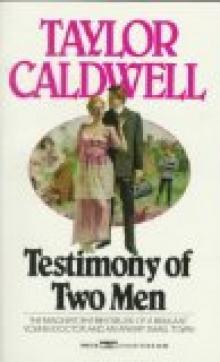 Testimony of Two Men
Testimony of Two Men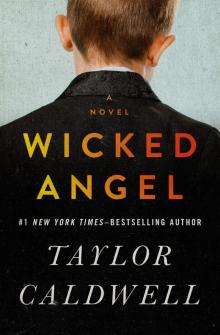 Wicked Angel
Wicked Angel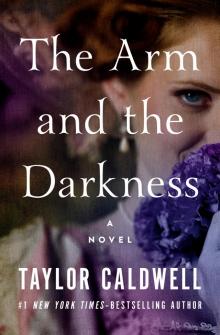 The Arm and the Darkness
The Arm and the Darkness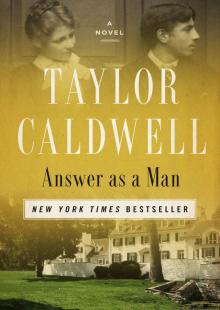 Answer as a Man
Answer as a Man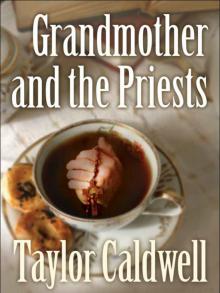 Grandmother and the Priests
Grandmother and the Priests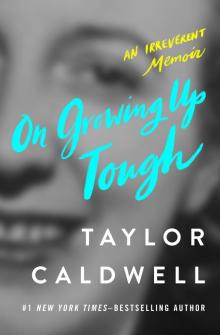 On Growing Up Tough: An Irreverent Memoir
On Growing Up Tough: An Irreverent Memoir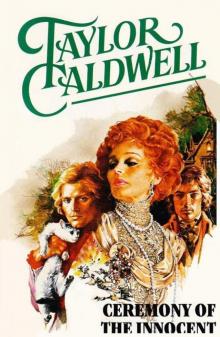 Ceremony of the Innocent
Ceremony of the Innocent The Listener
The Listener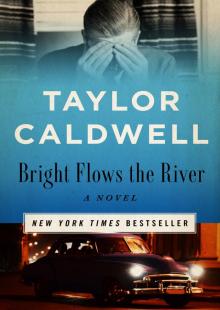 Bright Flows the River
Bright Flows the River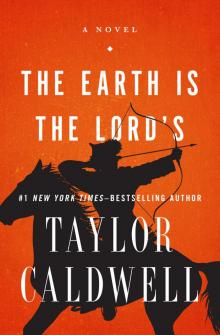 The Earth Is the Lord's
The Earth Is the Lord's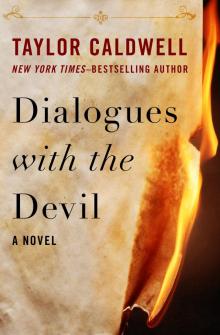 Dialogues With the Devil
Dialogues With the Devil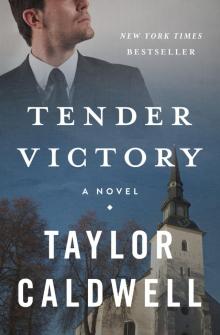 A Tender Victory
A Tender Victory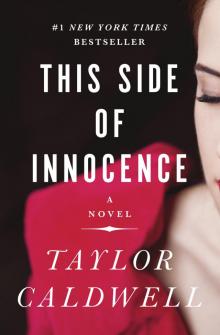 This Side of Innocence
This Side of Innocence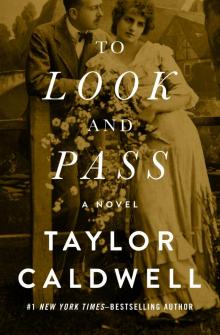 To Look and Pass
To Look and Pass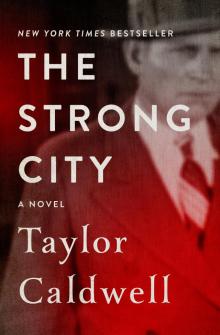 The Strong City
The Strong City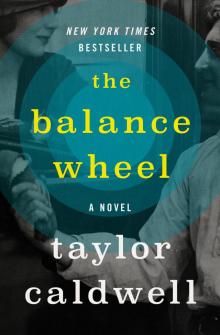 Balance Wheel
Balance Wheel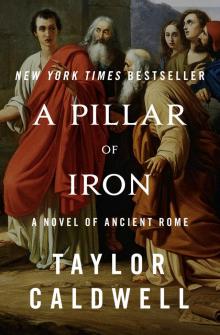 A Pillar of Iron: A Novel of Ancient Rome
A Pillar of Iron: A Novel of Ancient Rome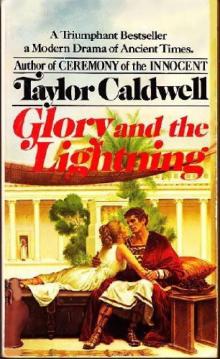 Glory and the Lightning
Glory and the Lightning Dear and Glorious Physician
Dear and Glorious Physician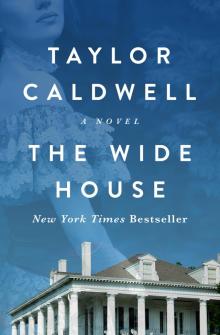 The Wide House
The Wide House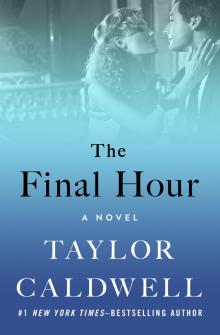 The Final Hour
The Final Hour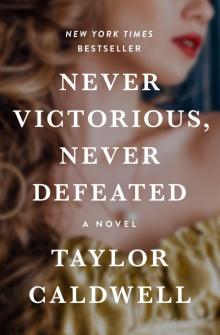 Never Victorious, Never Defeated
Never Victorious, Never Defeated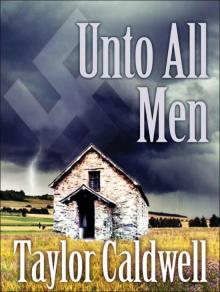 Unto All Men
Unto All Men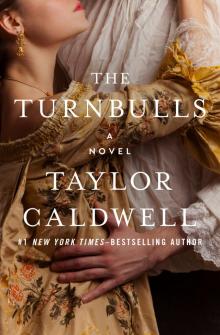 The Turnbulls
The Turnbulls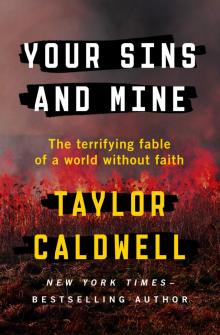 Your Sins and Mine: The Terrifying Fable of a World Without Faith
Your Sins and Mine: The Terrifying Fable of a World Without Faith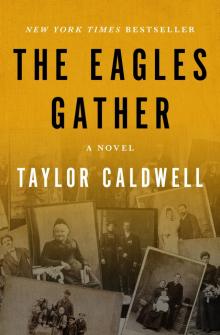 The Eagles Gather
The Eagles Gather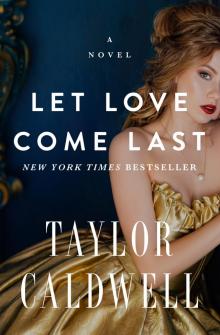 Let Love Come Last
Let Love Come Last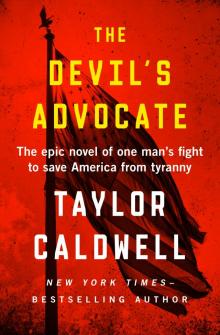 The Devil's Advocate: The Epic Novel of One Man's Fight to Save America From Tyranny
The Devil's Advocate: The Epic Novel of One Man's Fight to Save America From Tyranny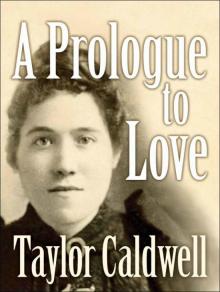 A Prologue to Love
A Prologue to Love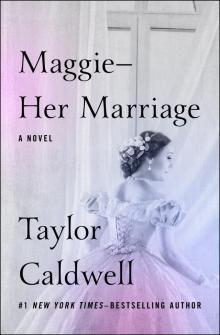 Maggie: Her Marriage
Maggie: Her Marriage The Late Clara Beame
The Late Clara Beame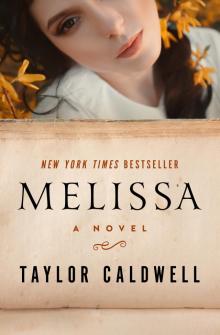 Melissa
Melissa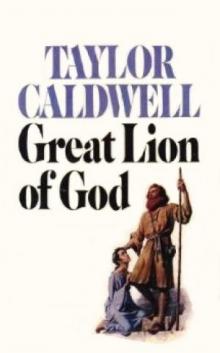 Great Lion of God
Great Lion of God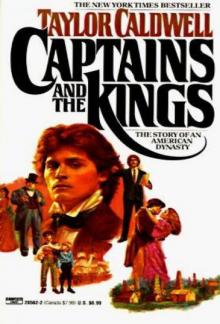 Captains and the Kings
Captains and the Kings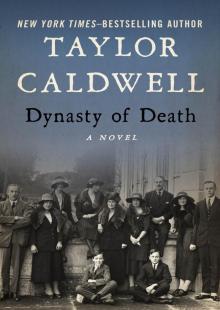 Dynasty of Death
Dynasty of Death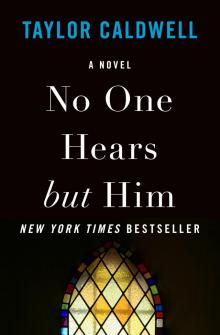 No One Hears but Him
No One Hears but Him The Sound of Thunder
The Sound of Thunder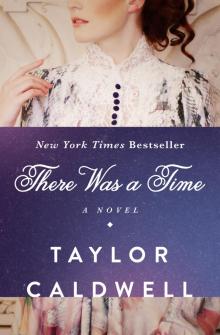 There Was a Time
There Was a Time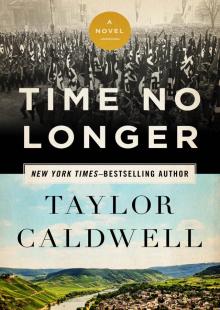 Time No Longer
Time No Longer I, Judas
I, Judas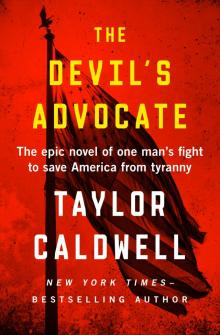 The Devil's Advocate
The Devil's Advocate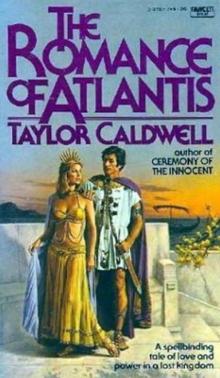 The Romance of Atlantis
The Romance of Atlantis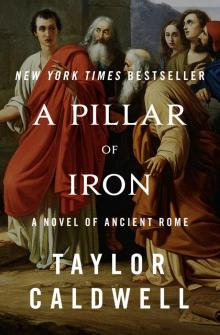 A Pillar of Iron
A Pillar of Iron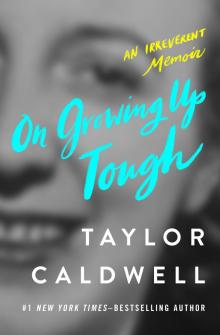 On Growing Up Tough
On Growing Up Tough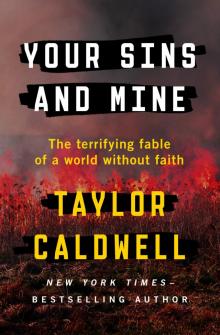 Your Sins and Mine
Your Sins and Mine